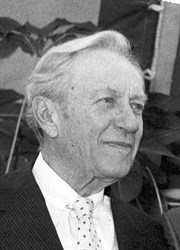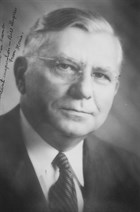Biography of Chester Ferguson
 When he died in 1983 at the age of 77, Chester Ferguson was acknowledged to be one of Florida's most powerful and prominent men. However, he started his law career in 1930 as an unpaid public defender after graduating from law school at the University of Florida. He fought in World War II in the Army Air Corps, where he was awarded the air medal and the bronze star, among other decorations.
When he died in 1983 at the age of 77, Chester Ferguson was acknowledged to be one of Florida's most powerful and prominent men. However, he started his law career in 1930 as an unpaid public defender after graduating from law school at the University of Florida. He fought in World War II in the Army Air Corps, where he was awarded the air medal and the bronze star, among other decorations.
Ferguson's importance to the Tampa community extended well beyond his legal career. In addition to his responsibilities at Macfarlane, Ferguson, he was the first Chairman of the Florida Board of Regents. He was the Chairman of the Board of Directors and Chief Executive Officer of Lykes Brothers, Inc., which at that time was a major force in business, including shipping, cattle, meat packing, citrus, banking, utilities, electronics and steel. He was also Chairman of the Board of Directors and CEO of First Florida Bank Corporation.
Ferguson was not a retiring person. He was important, and he knew it. He had flair. The stories about him are legion. One such story involves Ferguson's representation of a landowner in the U.S. government's eminent domain suit to condemn land for the expansion of MacDill Air Force Base. Ferguson obtained a large verdict for his client, and the government appealed. Terry Hodges (later a United States District Judge) and David Kerr, another attorney in Ferguson's firm, were told to write the brief. Ferguson was not satisfied with their efforts. He thought the brief did not capture the "flavor" of the trial and pointed them to his cross examination of the government's appraiser, which included the following exchange:
Ferguson: Now you say that among your qualifications is the work you did for General Pick in the 1942-1944 period during the war?
Witness: Yes.
Ferguson: How could that be so, when General Pick was with me in Burma then helping me build the Burma Road?
Although Chester Ferguson had actually served in Burma during World War II, had probably seen the Burma Road, and may have even driven a vehicle on it at some point, Kerr considered it something of a stretch for Ferguson to say he built the Burma Road! Ferguson's client prevailed.
Biography of Morris White
By the Honorable Paul M. Glenn
Morris White was a rebel. He was also never far in his heart from his beloved Mississippi and the University of Mississippi, where he played football and founded the school's newspaper.
the University of Mississippi, where he played football and founded the school's newspaper.
White, who was older than Ferguson, fought in France during World War I. He was captain of the infantry and, for years, represented the widows of men who had served under him - all at no fee.
In 1925, after practicing in Mississippi, White moved to Tampa because "there was more law business in Tampa than in the whole state of Mississippi." White traveled throughout the state of Florida trying cases. He became not only one of the state's best trial lawyers, but was considered a lawyer's lawyer.
Morris White's work ethic remains the stuff of legend. He interviewed all witnesses himself. He hand wrote all his statements. During trial, he usually slept in his office, working through the night. He made no compromises and took no shortcuts. Among Fowler, White's firm memorabilia is a note dated February 20, 1934 in White's handwriting: "I wonder if I am learning any law by reading all of these cases - anyway I am doing it." According to Tampa attorney Mike Kinney, when he first met White in 1964, he was told that White had read every Florida case in the Southern Reporter system up to that time. Kinney believed it.
Like Chester Ferguson, Morris White was also a man devoted to community service. He was an early leader of what ultimately became known as the United Way and the first Chairman of the Tampa Port Authority. He was also an organizer and board member of the First Florida Savings & Loan Association, which provided a means of financing homes for so many members of the Tampa community. White was the commander of American Legion Post No. 5 in Tampa - one of the largest American Legion posts in the United States.
After he slowed down his law practice in 1977, White taught himself Spanish. He was forever inquisitive. He loved cigars and concluded, based on research in medical journals and studies of civil war generals, that a drink a day was really good for you. He must have been right. Morris White died in 1988, at the age of 95.